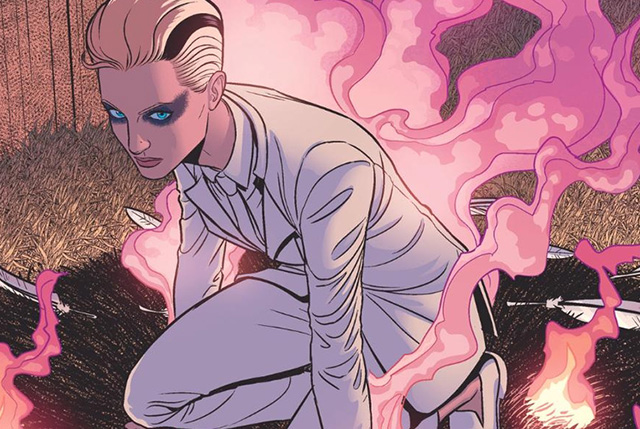Stop What You’re Doing and Read ‘The Wicked and The Divine’!

Immediately. I’m serious. If you are at all interested in comic books and, certainly, if you’re at all curious about the future of the industry you should not be doing anything with your time except for catching up on Kieron Gillen and Jamie McKelvie’s latest collaboration. I’m honestly not being hyperbolic. Everyone should be reading this book.
Like many people I am, generally, a superhero-centric comic reader. I read Saga in trade and have an ongoing fascination with the increasing number of graphic autobiographies a-la Persepolis that have been lining the shelves of the book store where I work, but my pull list has long been dominated by costumed heroes. Hero books are the foundation of the industry and they’re what people are usually buzzing about. But, almost a year ago, I started hearing rave reviews of a decidedly not-superhero book called, for short, WicDiv.
I was on a panel at Arisia 2015 about diversity in comics and, while I was confident in my ability to speak to diverse characters and creators in Marvel and DC, I found myself feeling woefully underqualified when my brilliant fellow panelists did most of their talking about books from smaller publishers. Everyone seemed to agree that, while the Big Two were starting to make meaningful gestures, when searching for truly diverse representation it was best to think small. I took a lot of notes during the panel and, in my notebook (circled several times) was WICKED AND DIVINE. Not long after that convention, a good friend started posting impassioned, gushing accolades of WicDiv to social media and quickly convinced me to pick up the first issue. Whether you’re typically interested in fantasy comics or not, The Wicked and The Divine is not a hard book to push on people.
Kieron Gillen and Jamie McKelvie are already well respected as a team for their previous book with Image Comics, Phonogram, and their very popular recent run of Young Avengers. Their popularity runs high among younger comic fans as they have a knack for creating unique, powerful, and believable young adult characters that are enhanced by McKelvie’s clean and bold artistic design. They have pretty impressive resumes individually as well, each having worked on some of Marvel’s most popular characters and titles in the last several years. Gillen’s 2011-2012 Journey Into Mystery run was widely praised and he is currently working on the excellent Star Wars: Darth Vader ongoing series. McKelvie, meanwhile, has worked on books as varied as Defenders, Gotham Gazette, and Cable. The tone, themes, and artistic style that made their previous books so distinct and appealing is in full force in WicDiv, making it perfect for anyone who has followed their work in the past or is interested in getting to know who’s who in today’s comic scene.
While I was a big fan of Gillen and McKelvie’s Young Avengers, what really pulled me into The Wicked and The Divine was the premise. Many comics begin each issue with a summary or “story thus far” kind of blurb. Never before WicDiv has one literally given me chills. In a straightforward, typically Gillen fashion, it goes like this: “Every 90 years, twelve gods return as young people. They are loved. They are hated. In two years, they are all dead.” As the series goes on, each time that almost mantra-like summary is repeated, it takes on a subtly different meaning, emphasizing something new about the story. If that’s not enough to grab you, the world building within that premise should be. We’re shown a society that is very much like ours, but intrinsically altered by these periodic “recurrences.” Entire belief systems and ideologies are devoted to the gods who are a very real, physical presence in the lives of their followers, who are treated like a fandom. While the lives of past Pantheons have only been hinted at thus far, the 21st Century gods are portrayed and treated as celebrities, pop stars, rockers, and icons of music and entertainment, a theme that Gillen and McKelvie have played with before with Phonogram. McKelvie’s art does wonders here, linking each deity to a specific genre, scene, or classic performer. Did I mention yet that Lucifer is David Bowie? Because there’s that. Clearly this is one hell of a premise. (Pun so intended.)
As I mentioned before, I first heard about this book during a panel on diverse comics and appropriately so, because if you’re looking a piece of media that is genuinely impressive in it’s diversity, The Wicked and The Divine fits the bill. Diversity in race, sexual orientation, gender identity and expression, and even systems of belief and morality are threaded into every panel and line of dialogue. Laura, the “fangirl” lead character, and at least six members of the Pantheon are people of color, an incredible number when you consider the racial diversity of comics in general. Significantly, the races of the gods exist independently of the origin of their theology, a point that is discussed in the first issue as a character questions whether it’s problematic for Amaterasu, a Japanese goddess, to be reincarnated as a white woman. In addition, the majority of the main characters are either identified outright as LGBT or portrayed ambiguously in that respect. Gillen and McKelvie also make a point of frequently addressing current issues related to sexism and gender throughout the book. Cassandra, a skeptical reporter covering the recurrence, is a trans woman who regularly faces transphobia from other characters and Tara, a member of the pantheon is subjected to online harassment and regular threats of sexual violence. WicDiv is exciting and intriguing in that it doesn’t just toss in tokens of diversity, but confronts concepts like victimization and marginalization head on, contrasting them against the incredible powers the gods of the Pantheon are able to wield.
All in all, that’s a lot to say about a comic book that just released its 14th issue two weeks ago, and those were only my top three reasons to read it! This series has so many interesting facets and so much going on that it can look overwhelming at first, but the pacing is deliberately slow enough to make sure every detail sinks into your head as you wait for the next issue. Gillen strings you along with just enough plot every time to keep you hooked, while never giving enough away that you can figure out where it’s all headed. Whatever direction Gillen and McKelvie are planning on taking for the wider plot of the series, there’s clearly still a long way to go before the whole story is told…plenty of time to catch up! So grab “The Faust Act” wherever you buy your comics, join the Fantheon, and help us theorize just what the heck that Ananke character is actually up to.



